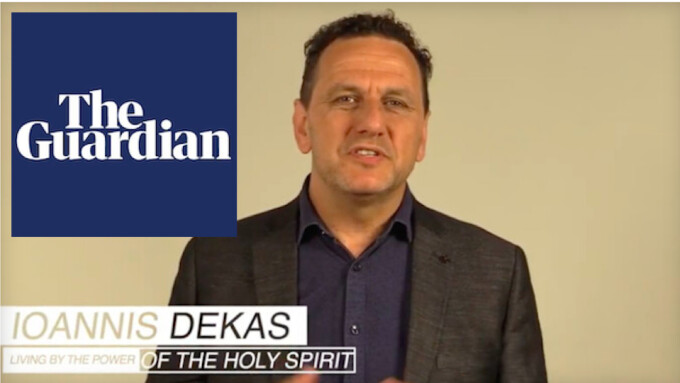LONDON — The Guardian today again published a supposed news article advocating requiring age verification for viewing adult content — but which was, in fact, content sponsored by a shadowy U.S. foundation that pays the Anglo-American newspaper to further its purported mission to combat human trafficking.
The Guardian’s article, which was designed to look like standard editorial content, also failed to identify the man behind the current age verification campaign as a London clergyman and religious anti-porn crusader.
The article, headlined “Campaigners Threaten U.K. Legal Action Over Porn Sites’ Lack of Age Verification,” was penned by Harriet Grant and Dan Milmo.
The article was produced under the paid sponsorship of a foundation called Humanity United, which is connected to a network of U.S.-based foundations and charities with vague “humanity improvement” goals funded by tech billionaire and Bay Area socialite Pierre Omidyar and his wife Pam Omidyar.
As XBIZ exclusively revealed in a 2019 investigation, the Omidyars operate behind the umbrella philanthropic organization the Omidyar Group.
Humanity United is responsible for funding the vast majority of The Guardian’s coverage of sex work and adult content, provided that it is exclusively framed in terms of “exploitation” and “human trafficking.”
Like the BBC, The Guardian Neglects to ID Anti-Porn Clergyman
Today’s story fit within The Guardian’s and its U.S. philanthropic backers' agenda: to characterize the complex issues around AV in the U.K. — currently the subject of a moral panic campaign by press outlets from the tabloids to the BBC — only in terms of “harms” and the supposed effects of pornography on “children and teens.”
Most egregiously, The Guardian/Humanity United writers echo the negligence of the BBC’s Education Editor Branwen Jeffreys by refusing to identify the main crusader and plaintiff in the current AV cases, Ioannis Dekas, as a London clergyman and vocal anti-porn crusader on religious grounds, who even hosts a YouTube channel of sermons railing against the adult industry.
The BBC's Jeffreys failed to identify Dekas' religious status in her May article advocating for his crusade.
Today’s Guardian article describes Dekas merely as “a father of four who is giving evidence about the impact of porn on his own children, despite his efforts to stop them watching it.”
Following the agenda of their Omidyar foundation sponsors, the Guardian/Humanity United writers did not interview anyone knowledgeable about digital rights, and made a number of claims linking “porn” to supposed harms inflicted on “children and teens.”
A Moral Argument for Censorship
The article ends with a call for state censorship from a college student affiliated with Father Dekas’ crusade.
“It is incredibly important that we prevent access to pornography for young children,” said 20-year-old Ava Vakil, making a moral argument for censorship. “Particularly given that so much of pornographic content online includes sexual violence and the objectification of women. Most children encounter porn online before they talk about sexual consent in PSHE or at home, creating a culture in which sex becomes deviant and pornographic, and not based in shared trust and intimacy."
"It is simply unbelievable that children are prevented from seeing a rated-18 film in the cinema, and yet can access sexually violent and explicit content with a few taps of their fingers," Vakil told the Guardian/Humanity United writers, who failed to contact anyone who might challenge those claims.
Sponsored Content Masquerading as Standard Journalism
Although The Guardian's War On Porn articles in its "Exploitation in Focus" series resemble the paper's regular news items, a closer look at the byline reveals that the content was produced "under the sponsorship of Humanity United."
Buried in the small print next to the article is a link leading to a page where The Guardian discloses that the "Exploitation in Focus" series is "supported, in part, through a grant to TheGuardian.org by Humanity United, a U.S.-based foundation dedicated to bringing new approaches to global problems that have long been considered intractable."
According to the disclaimer, the Humanity United content is "editorially independent and covers modern-day slavery" while "all our journalism follows GNM’s published editorial code."
By categorizing "pornography" alongside "modern-day slavery," however, The Guardian conflates legitimate adult entertainment production and distribution — i.e., legal, consensual porn — with "human trafficking."
The Guardian did not comment about its refusal to cover most sex worker and adult content issues outside of the Omidyar/Humanity United sponsored content; the BBC also did not comment about its refusal to identify Father Dekas as a religiously-motivated anti-porn crusader.








